Tourism and Society: Sociological Perspectives, Impacts, and Analysis
VerifiedAdded on 2023/06/05
|11
|3125
|100
Essay
AI Summary
This essay provides a comprehensive overview of the tourism industry and its multifaceted impacts on society, exploring the intricate relationship between the two through various sociological theories, principles, and practices. It delves into the economic contributions of tourism, such as job creation and GDP enhancement, while also addressing challenges like gender bias and ethical considerations. The essay examines models like the Tourism Life Cycle to illustrate the evolution of tourist destinations and employs PESTEL analysis to dissect the political, economic, social, technological, environmental, and legal factors influencing the industry and its societal effects. Furthermore, it highlights the cultural impacts, both positive and negative, and discusses tourist typologies, providing a holistic understanding of tourism's role in shaping and being shaped by society. Desklib offers this essay as a valuable resource, alongside a wealth of other academic materials for students.
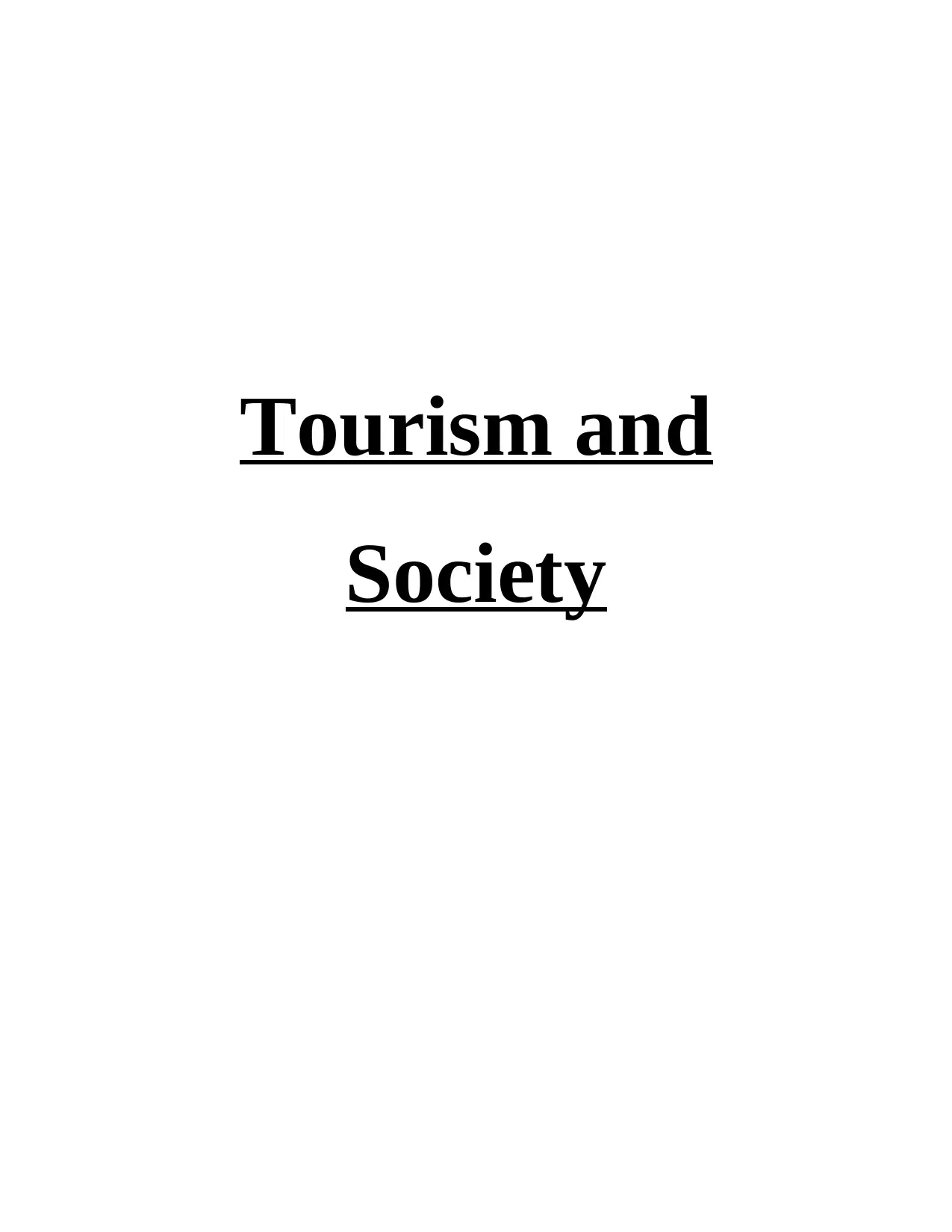
Tourism and
Society
Society
Paraphrase This Document
Need a fresh take? Get an instant paraphrase of this document with our AI Paraphraser

Contents
INTRODUCTION...........................................................................................................................1
MAIN BODY..................................................................................................................................1
CONCLUSION................................................................................................................................1
REFERENCES................................................................................................................................2
INTRODUCTION...........................................................................................................................1
MAIN BODY..................................................................................................................................1
CONCLUSION................................................................................................................................1
REFERENCES................................................................................................................................2
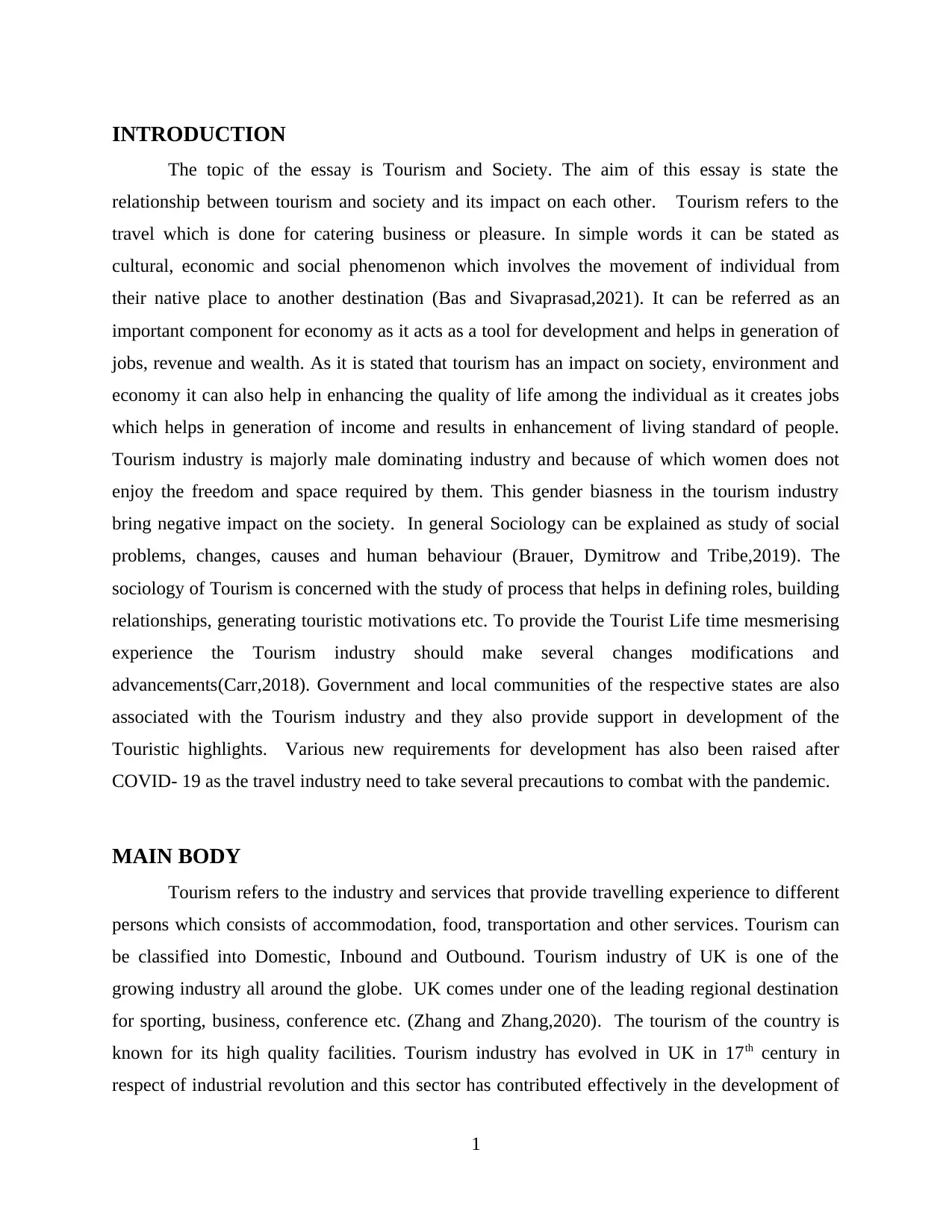
INTRODUCTION
The topic of the essay is Tourism and Society. The aim of this essay is state the
relationship between tourism and society and its impact on each other. Tourism refers to the
travel which is done for catering business or pleasure. In simple words it can be stated as
cultural, economic and social phenomenon which involves the movement of individual from
their native place to another destination (Bas and Sivaprasad,2021). It can be referred as an
important component for economy as it acts as a tool for development and helps in generation of
jobs, revenue and wealth. As it is stated that tourism has an impact on society, environment and
economy it can also help in enhancing the quality of life among the individual as it creates jobs
which helps in generation of income and results in enhancement of living standard of people.
Tourism industry is majorly male dominating industry and because of which women does not
enjoy the freedom and space required by them. This gender biasness in the tourism industry
bring negative impact on the society. In general Sociology can be explained as study of social
problems, changes, causes and human behaviour (Brauer, Dymitrow and Tribe,2019). The
sociology of Tourism is concerned with the study of process that helps in defining roles, building
relationships, generating touristic motivations etc. To provide the Tourist Life time mesmerising
experience the Tourism industry should make several changes modifications and
advancements(Carr,2018). Government and local communities of the respective states are also
associated with the Tourism industry and they also provide support in development of the
Touristic highlights. Various new requirements for development has also been raised after
COVID- 19 as the travel industry need to take several precautions to combat with the pandemic.
MAIN BODY
Tourism refers to the industry and services that provide travelling experience to different
persons which consists of accommodation, food, transportation and other services. Tourism can
be classified into Domestic, Inbound and Outbound. Tourism industry of UK is one of the
growing industry all around the globe. UK comes under one of the leading regional destination
for sporting, business, conference etc. (Zhang and Zhang,2020). The tourism of the country is
known for its high quality facilities. Tourism industry has evolved in UK in 17th century in
respect of industrial revolution and this sector has contributed effectively in the development of
1
The topic of the essay is Tourism and Society. The aim of this essay is state the
relationship between tourism and society and its impact on each other. Tourism refers to the
travel which is done for catering business or pleasure. In simple words it can be stated as
cultural, economic and social phenomenon which involves the movement of individual from
their native place to another destination (Bas and Sivaprasad,2021). It can be referred as an
important component for economy as it acts as a tool for development and helps in generation of
jobs, revenue and wealth. As it is stated that tourism has an impact on society, environment and
economy it can also help in enhancing the quality of life among the individual as it creates jobs
which helps in generation of income and results in enhancement of living standard of people.
Tourism industry is majorly male dominating industry and because of which women does not
enjoy the freedom and space required by them. This gender biasness in the tourism industry
bring negative impact on the society. In general Sociology can be explained as study of social
problems, changes, causes and human behaviour (Brauer, Dymitrow and Tribe,2019). The
sociology of Tourism is concerned with the study of process that helps in defining roles, building
relationships, generating touristic motivations etc. To provide the Tourist Life time mesmerising
experience the Tourism industry should make several changes modifications and
advancements(Carr,2018). Government and local communities of the respective states are also
associated with the Tourism industry and they also provide support in development of the
Touristic highlights. Various new requirements for development has also been raised after
COVID- 19 as the travel industry need to take several precautions to combat with the pandemic.
MAIN BODY
Tourism refers to the industry and services that provide travelling experience to different
persons which consists of accommodation, food, transportation and other services. Tourism can
be classified into Domestic, Inbound and Outbound. Tourism industry of UK is one of the
growing industry all around the globe. UK comes under one of the leading regional destination
for sporting, business, conference etc. (Zhang and Zhang,2020). The tourism of the country is
known for its high quality facilities. Tourism industry has evolved in UK in 17th century in
respect of industrial revolution and this sector has contributed effectively in the development of
1
⊘ This is a preview!⊘
Do you want full access?
Subscribe today to unlock all pages.

Trusted by 1+ million students worldwide
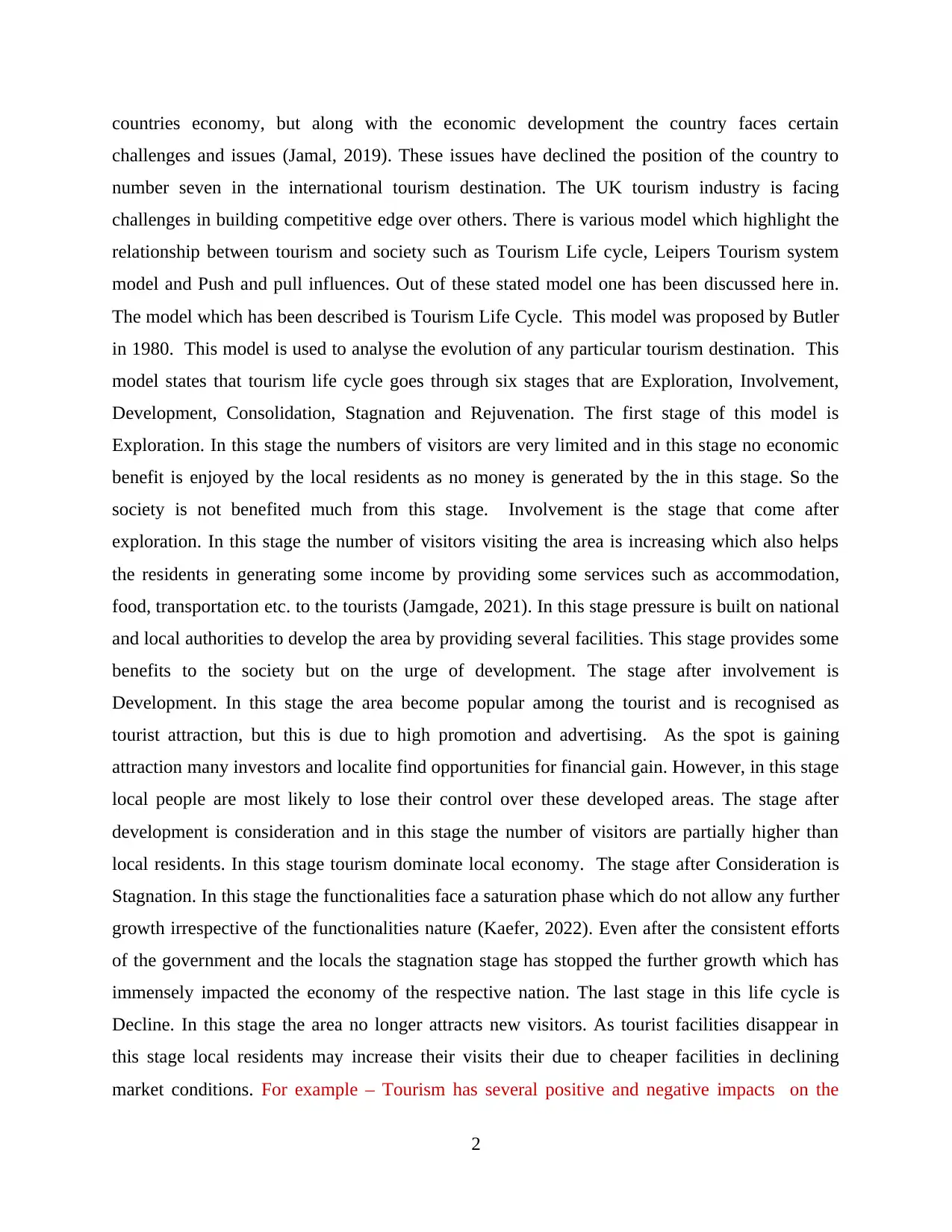
countries economy, but along with the economic development the country faces certain
challenges and issues (Jamal, 2019). These issues have declined the position of the country to
number seven in the international tourism destination. The UK tourism industry is facing
challenges in building competitive edge over others. There is various model which highlight the
relationship between tourism and society such as Tourism Life cycle, Leipers Tourism system
model and Push and pull influences. Out of these stated model one has been discussed here in.
The model which has been described is Tourism Life Cycle. This model was proposed by Butler
in 1980. This model is used to analyse the evolution of any particular tourism destination. This
model states that tourism life cycle goes through six stages that are Exploration, Involvement,
Development, Consolidation, Stagnation and Rejuvenation. The first stage of this model is
Exploration. In this stage the numbers of visitors are very limited and in this stage no economic
benefit is enjoyed by the local residents as no money is generated by the in this stage. So the
society is not benefited much from this stage. Involvement is the stage that come after
exploration. In this stage the number of visitors visiting the area is increasing which also helps
the residents in generating some income by providing some services such as accommodation,
food, transportation etc. to the tourists (Jamgade, 2021). In this stage pressure is built on national
and local authorities to develop the area by providing several facilities. This stage provides some
benefits to the society but on the urge of development. The stage after involvement is
Development. In this stage the area become popular among the tourist and is recognised as
tourist attraction, but this is due to high promotion and advertising. As the spot is gaining
attraction many investors and localite find opportunities for financial gain. However, in this stage
local people are most likely to lose their control over these developed areas. The stage after
development is consideration and in this stage the number of visitors are partially higher than
local residents. In this stage tourism dominate local economy. The stage after Consideration is
Stagnation. In this stage the functionalities face a saturation phase which do not allow any further
growth irrespective of the functionalities nature (Kaefer, 2022). Even after the consistent efforts
of the government and the locals the stagnation stage has stopped the further growth which has
immensely impacted the economy of the respective nation. The last stage in this life cycle is
Decline. In this stage the area no longer attracts new visitors. As tourist facilities disappear in
this stage local residents may increase their visits their due to cheaper facilities in declining
market conditions. For example – Tourism has several positive and negative impacts on the
2
challenges and issues (Jamal, 2019). These issues have declined the position of the country to
number seven in the international tourism destination. The UK tourism industry is facing
challenges in building competitive edge over others. There is various model which highlight the
relationship between tourism and society such as Tourism Life cycle, Leipers Tourism system
model and Push and pull influences. Out of these stated model one has been discussed here in.
The model which has been described is Tourism Life Cycle. This model was proposed by Butler
in 1980. This model is used to analyse the evolution of any particular tourism destination. This
model states that tourism life cycle goes through six stages that are Exploration, Involvement,
Development, Consolidation, Stagnation and Rejuvenation. The first stage of this model is
Exploration. In this stage the numbers of visitors are very limited and in this stage no economic
benefit is enjoyed by the local residents as no money is generated by the in this stage. So the
society is not benefited much from this stage. Involvement is the stage that come after
exploration. In this stage the number of visitors visiting the area is increasing which also helps
the residents in generating some income by providing some services such as accommodation,
food, transportation etc. to the tourists (Jamgade, 2021). In this stage pressure is built on national
and local authorities to develop the area by providing several facilities. This stage provides some
benefits to the society but on the urge of development. The stage after involvement is
Development. In this stage the area become popular among the tourist and is recognised as
tourist attraction, but this is due to high promotion and advertising. As the spot is gaining
attraction many investors and localite find opportunities for financial gain. However, in this stage
local people are most likely to lose their control over these developed areas. The stage after
development is consideration and in this stage the number of visitors are partially higher than
local residents. In this stage tourism dominate local economy. The stage after Consideration is
Stagnation. In this stage the functionalities face a saturation phase which do not allow any further
growth irrespective of the functionalities nature (Kaefer, 2022). Even after the consistent efforts
of the government and the locals the stagnation stage has stopped the further growth which has
immensely impacted the economy of the respective nation. The last stage in this life cycle is
Decline. In this stage the area no longer attracts new visitors. As tourist facilities disappear in
this stage local residents may increase their visits their due to cheaper facilities in declining
market conditions. For example – Tourism has several positive and negative impacts on the
2
Paraphrase This Document
Need a fresh take? Get an instant paraphrase of this document with our AI Paraphraser
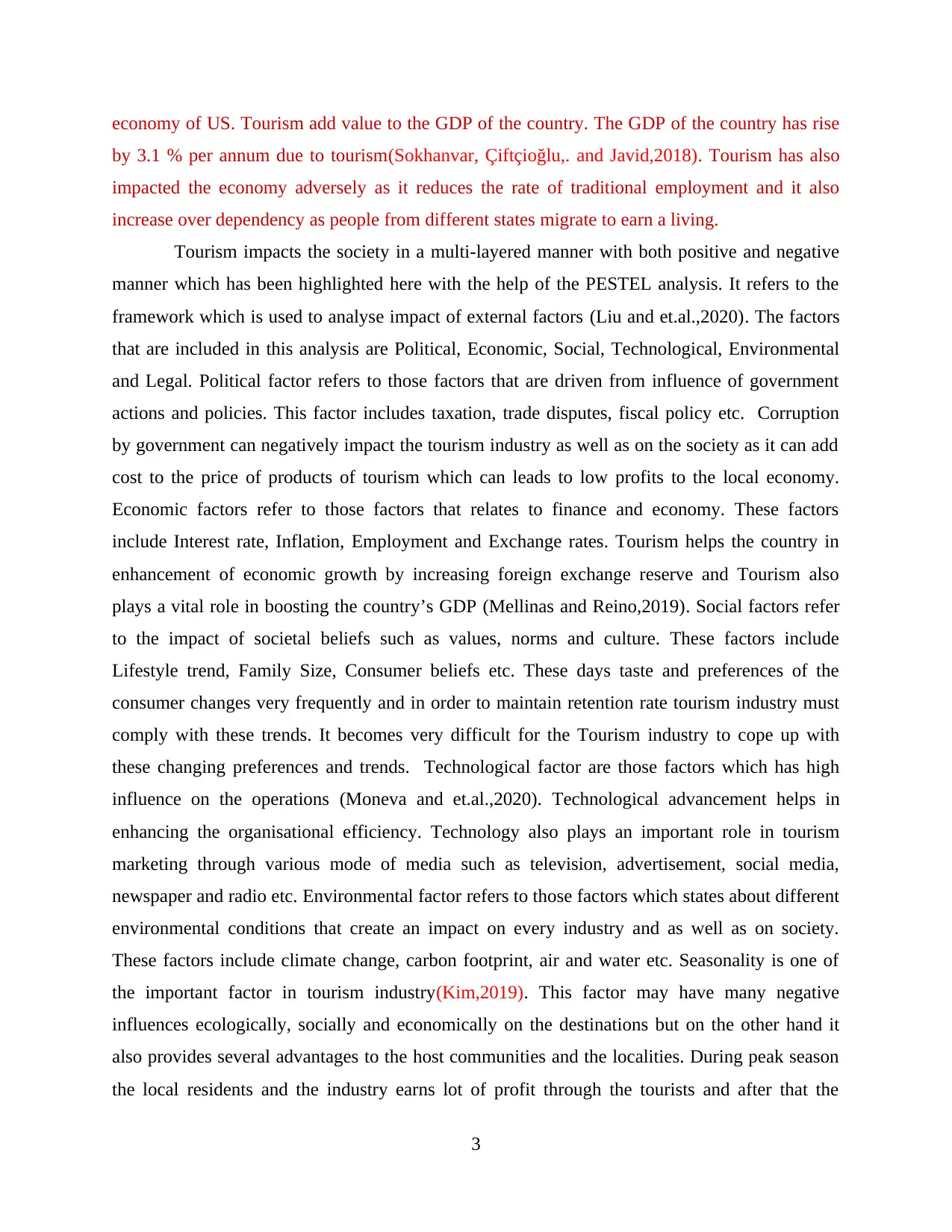
economy of US. Tourism add value to the GDP of the country. The GDP of the country has rise
by 3.1 % per annum due to tourism(Sokhanvar, Çiftçioğlu,. and Javid,2018). Tourism has also
impacted the economy adversely as it reduces the rate of traditional employment and it also
increase over dependency as people from different states migrate to earn a living.
Tourism impacts the society in a multi-layered manner with both positive and negative
manner which has been highlighted here with the help of the PESTEL analysis. It refers to the
framework which is used to analyse impact of external factors (Liu and et.al.,2020). The factors
that are included in this analysis are Political, Economic, Social, Technological, Environmental
and Legal. Political factor refers to those factors that are driven from influence of government
actions and policies. This factor includes taxation, trade disputes, fiscal policy etc. Corruption
by government can negatively impact the tourism industry as well as on the society as it can add
cost to the price of products of tourism which can leads to low profits to the local economy.
Economic factors refer to those factors that relates to finance and economy. These factors
include Interest rate, Inflation, Employment and Exchange rates. Tourism helps the country in
enhancement of economic growth by increasing foreign exchange reserve and Tourism also
plays a vital role in boosting the country’s GDP (Mellinas and Reino,2019). Social factors refer
to the impact of societal beliefs such as values, norms and culture. These factors include
Lifestyle trend, Family Size, Consumer beliefs etc. These days taste and preferences of the
consumer changes very frequently and in order to maintain retention rate tourism industry must
comply with these trends. It becomes very difficult for the Tourism industry to cope up with
these changing preferences and trends. Technological factor are those factors which has high
influence on the operations (Moneva and et.al.,2020). Technological advancement helps in
enhancing the organisational efficiency. Technology also plays an important role in tourism
marketing through various mode of media such as television, advertisement, social media,
newspaper and radio etc. Environmental factor refers to those factors which states about different
environmental conditions that create an impact on every industry and as well as on society.
These factors include climate change, carbon footprint, air and water etc. Seasonality is one of
the important factor in tourism industry(Kim,2019). This factor may have many negative
influences ecologically, socially and economically on the destinations but on the other hand it
also provides several advantages to the host communities and the localities. During peak season
the local residents and the industry earns lot of profit through the tourists and after that the
3
by 3.1 % per annum due to tourism(Sokhanvar, Çiftçioğlu,. and Javid,2018). Tourism has also
impacted the economy adversely as it reduces the rate of traditional employment and it also
increase over dependency as people from different states migrate to earn a living.
Tourism impacts the society in a multi-layered manner with both positive and negative
manner which has been highlighted here with the help of the PESTEL analysis. It refers to the
framework which is used to analyse impact of external factors (Liu and et.al.,2020). The factors
that are included in this analysis are Political, Economic, Social, Technological, Environmental
and Legal. Political factor refers to those factors that are driven from influence of government
actions and policies. This factor includes taxation, trade disputes, fiscal policy etc. Corruption
by government can negatively impact the tourism industry as well as on the society as it can add
cost to the price of products of tourism which can leads to low profits to the local economy.
Economic factors refer to those factors that relates to finance and economy. These factors
include Interest rate, Inflation, Employment and Exchange rates. Tourism helps the country in
enhancement of economic growth by increasing foreign exchange reserve and Tourism also
plays a vital role in boosting the country’s GDP (Mellinas and Reino,2019). Social factors refer
to the impact of societal beliefs such as values, norms and culture. These factors include
Lifestyle trend, Family Size, Consumer beliefs etc. These days taste and preferences of the
consumer changes very frequently and in order to maintain retention rate tourism industry must
comply with these trends. It becomes very difficult for the Tourism industry to cope up with
these changing preferences and trends. Technological factor are those factors which has high
influence on the operations (Moneva and et.al.,2020). Technological advancement helps in
enhancing the organisational efficiency. Technology also plays an important role in tourism
marketing through various mode of media such as television, advertisement, social media,
newspaper and radio etc. Environmental factor refers to those factors which states about different
environmental conditions that create an impact on every industry and as well as on society.
These factors include climate change, carbon footprint, air and water etc. Seasonality is one of
the important factor in tourism industry(Kim,2019). This factor may have many negative
influences ecologically, socially and economically on the destinations but on the other hand it
also provides several advantages to the host communities and the localities. During peak season
the local residents and the industry earns lot of profit through the tourists and after that the
3
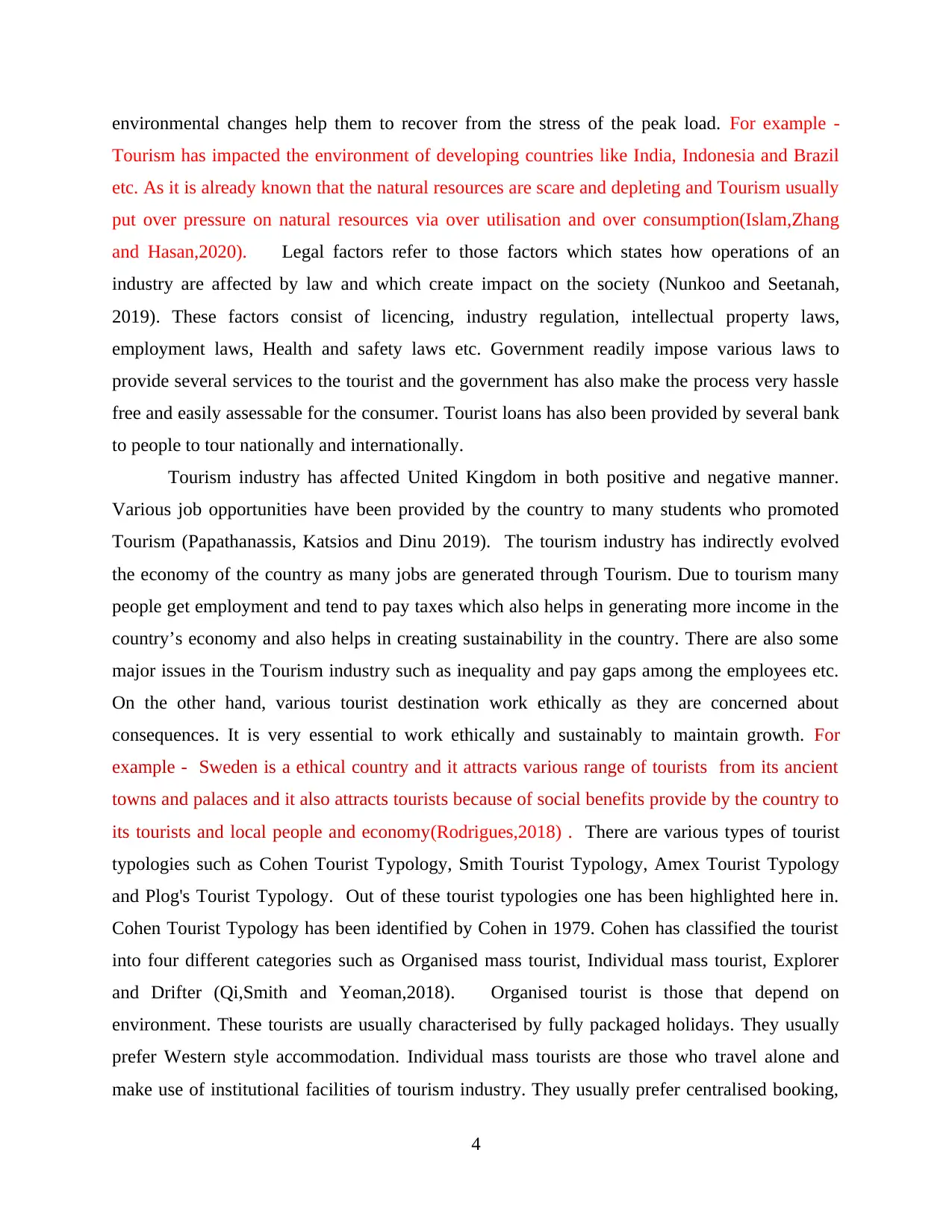
environmental changes help them to recover from the stress of the peak load. For example -
Tourism has impacted the environment of developing countries like India, Indonesia and Brazil
etc. As it is already known that the natural resources are scare and depleting and Tourism usually
put over pressure on natural resources via over utilisation and over consumption(Islam,Zhang
and Hasan,2020). Legal factors refer to those factors which states how operations of an
industry are affected by law and which create impact on the society (Nunkoo and Seetanah,
2019). These factors consist of licencing, industry regulation, intellectual property laws,
employment laws, Health and safety laws etc. Government readily impose various laws to
provide several services to the tourist and the government has also make the process very hassle
free and easily assessable for the consumer. Tourist loans has also been provided by several bank
to people to tour nationally and internationally.
Tourism industry has affected United Kingdom in both positive and negative manner.
Various job opportunities have been provided by the country to many students who promoted
Tourism (Papathanassis, Katsios and Dinu 2019). The tourism industry has indirectly evolved
the economy of the country as many jobs are generated through Tourism. Due to tourism many
people get employment and tend to pay taxes which also helps in generating more income in the
country’s economy and also helps in creating sustainability in the country. There are also some
major issues in the Tourism industry such as inequality and pay gaps among the employees etc.
On the other hand, various tourist destination work ethically as they are concerned about
consequences. It is very essential to work ethically and sustainably to maintain growth. For
example - Sweden is a ethical country and it attracts various range of tourists from its ancient
towns and palaces and it also attracts tourists because of social benefits provide by the country to
its tourists and local people and economy(Rodrigues,2018) . There are various types of tourist
typologies such as Cohen Tourist Typology, Smith Tourist Typology, Amex Tourist Typology
and Plog's Tourist Typology. Out of these tourist typologies one has been highlighted here in.
Cohen Tourist Typology has been identified by Cohen in 1979. Cohen has classified the tourist
into four different categories such as Organised mass tourist, Individual mass tourist, Explorer
and Drifter (Qi,Smith and Yeoman,2018). Organised tourist is those that depend on
environment. These tourists are usually characterised by fully packaged holidays. They usually
prefer Western style accommodation. Individual mass tourists are those who travel alone and
make use of institutional facilities of tourism industry. They usually prefer centralised booking,
4
Tourism has impacted the environment of developing countries like India, Indonesia and Brazil
etc. As it is already known that the natural resources are scare and depleting and Tourism usually
put over pressure on natural resources via over utilisation and over consumption(Islam,Zhang
and Hasan,2020). Legal factors refer to those factors which states how operations of an
industry are affected by law and which create impact on the society (Nunkoo and Seetanah,
2019). These factors consist of licencing, industry regulation, intellectual property laws,
employment laws, Health and safety laws etc. Government readily impose various laws to
provide several services to the tourist and the government has also make the process very hassle
free and easily assessable for the consumer. Tourist loans has also been provided by several bank
to people to tour nationally and internationally.
Tourism industry has affected United Kingdom in both positive and negative manner.
Various job opportunities have been provided by the country to many students who promoted
Tourism (Papathanassis, Katsios and Dinu 2019). The tourism industry has indirectly evolved
the economy of the country as many jobs are generated through Tourism. Due to tourism many
people get employment and tend to pay taxes which also helps in generating more income in the
country’s economy and also helps in creating sustainability in the country. There are also some
major issues in the Tourism industry such as inequality and pay gaps among the employees etc.
On the other hand, various tourist destination work ethically as they are concerned about
consequences. It is very essential to work ethically and sustainably to maintain growth. For
example - Sweden is a ethical country and it attracts various range of tourists from its ancient
towns and palaces and it also attracts tourists because of social benefits provide by the country to
its tourists and local people and economy(Rodrigues,2018) . There are various types of tourist
typologies such as Cohen Tourist Typology, Smith Tourist Typology, Amex Tourist Typology
and Plog's Tourist Typology. Out of these tourist typologies one has been highlighted here in.
Cohen Tourist Typology has been identified by Cohen in 1979. Cohen has classified the tourist
into four different categories such as Organised mass tourist, Individual mass tourist, Explorer
and Drifter (Qi,Smith and Yeoman,2018). Organised tourist is those that depend on
environment. These tourists are usually characterised by fully packaged holidays. They usually
prefer Western style accommodation. Individual mass tourists are those who travel alone and
make use of institutional facilities of tourism industry. They usually prefer centralised booking,
4
⊘ This is a preview!⊘
Do you want full access?
Subscribe today to unlock all pages.

Trusted by 1+ million students worldwide
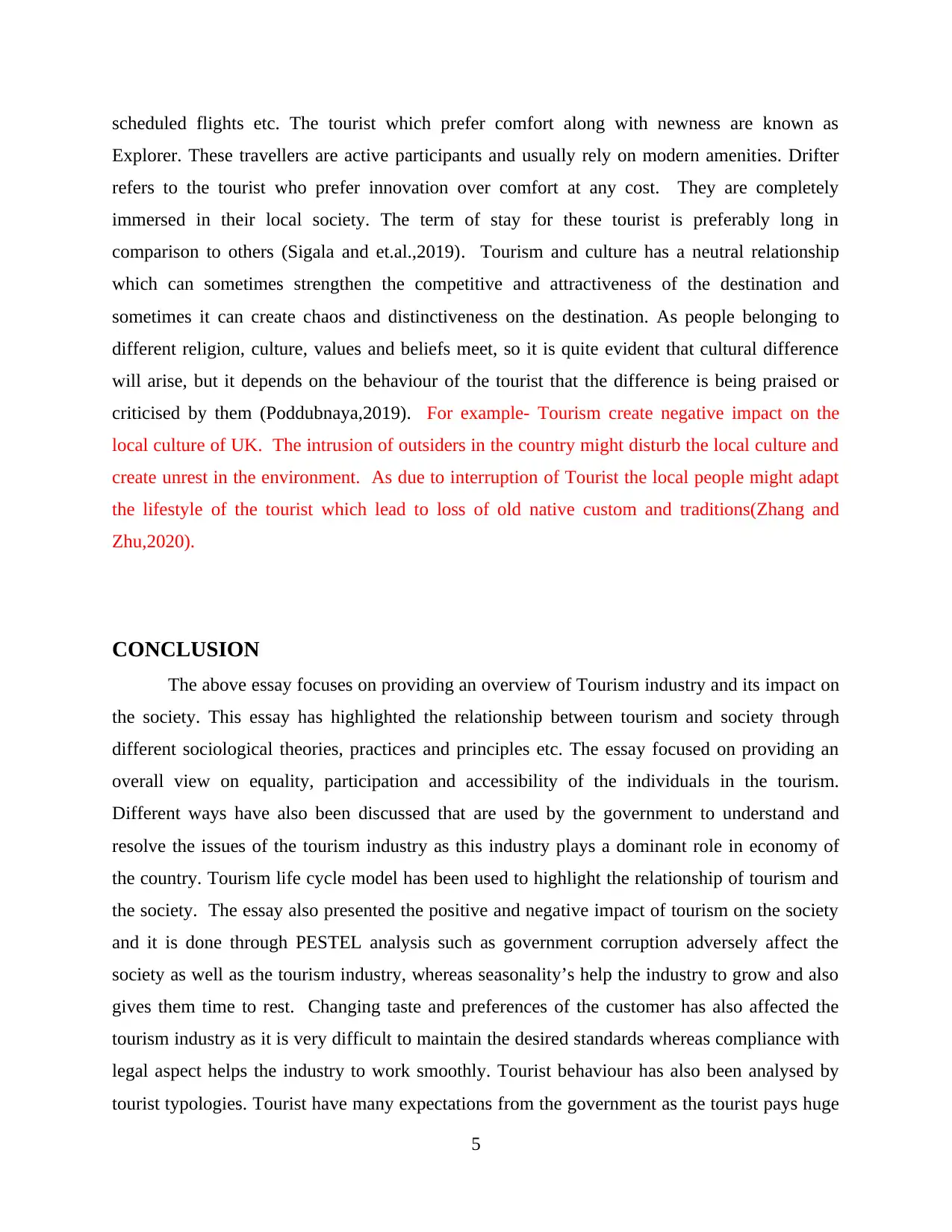
scheduled flights etc. The tourist which prefer comfort along with newness are known as
Explorer. These travellers are active participants and usually rely on modern amenities. Drifter
refers to the tourist who prefer innovation over comfort at any cost. They are completely
immersed in their local society. The term of stay for these tourist is preferably long in
comparison to others (Sigala and et.al.,2019). Tourism and culture has a neutral relationship
which can sometimes strengthen the competitive and attractiveness of the destination and
sometimes it can create chaos and distinctiveness on the destination. As people belonging to
different religion, culture, values and beliefs meet, so it is quite evident that cultural difference
will arise, but it depends on the behaviour of the tourist that the difference is being praised or
criticised by them (Poddubnaya,2019). For example- Tourism create negative impact on the
local culture of UK. The intrusion of outsiders in the country might disturb the local culture and
create unrest in the environment. As due to interruption of Tourist the local people might adapt
the lifestyle of the tourist which lead to loss of old native custom and traditions(Zhang and
Zhu,2020).
CONCLUSION
The above essay focuses on providing an overview of Tourism industry and its impact on
the society. This essay has highlighted the relationship between tourism and society through
different sociological theories, practices and principles etc. The essay focused on providing an
overall view on equality, participation and accessibility of the individuals in the tourism.
Different ways have also been discussed that are used by the government to understand and
resolve the issues of the tourism industry as this industry plays a dominant role in economy of
the country. Tourism life cycle model has been used to highlight the relationship of tourism and
the society. The essay also presented the positive and negative impact of tourism on the society
and it is done through PESTEL analysis such as government corruption adversely affect the
society as well as the tourism industry, whereas seasonality’s help the industry to grow and also
gives them time to rest. Changing taste and preferences of the customer has also affected the
tourism industry as it is very difficult to maintain the desired standards whereas compliance with
legal aspect helps the industry to work smoothly. Tourist behaviour has also been analysed by
tourist typologies. Tourist have many expectations from the government as the tourist pays huge
5
Explorer. These travellers are active participants and usually rely on modern amenities. Drifter
refers to the tourist who prefer innovation over comfort at any cost. They are completely
immersed in their local society. The term of stay for these tourist is preferably long in
comparison to others (Sigala and et.al.,2019). Tourism and culture has a neutral relationship
which can sometimes strengthen the competitive and attractiveness of the destination and
sometimes it can create chaos and distinctiveness on the destination. As people belonging to
different religion, culture, values and beliefs meet, so it is quite evident that cultural difference
will arise, but it depends on the behaviour of the tourist that the difference is being praised or
criticised by them (Poddubnaya,2019). For example- Tourism create negative impact on the
local culture of UK. The intrusion of outsiders in the country might disturb the local culture and
create unrest in the environment. As due to interruption of Tourist the local people might adapt
the lifestyle of the tourist which lead to loss of old native custom and traditions(Zhang and
Zhu,2020).
CONCLUSION
The above essay focuses on providing an overview of Tourism industry and its impact on
the society. This essay has highlighted the relationship between tourism and society through
different sociological theories, practices and principles etc. The essay focused on providing an
overall view on equality, participation and accessibility of the individuals in the tourism.
Different ways have also been discussed that are used by the government to understand and
resolve the issues of the tourism industry as this industry plays a dominant role in economy of
the country. Tourism life cycle model has been used to highlight the relationship of tourism and
the society. The essay also presented the positive and negative impact of tourism on the society
and it is done through PESTEL analysis such as government corruption adversely affect the
society as well as the tourism industry, whereas seasonality’s help the industry to grow and also
gives them time to rest. Changing taste and preferences of the customer has also affected the
tourism industry as it is very difficult to maintain the desired standards whereas compliance with
legal aspect helps the industry to work smoothly. Tourist behaviour has also been analysed by
tourist typologies. Tourist have many expectations from the government as the tourist pays huge
5
Paraphrase This Document
Need a fresh take? Get an instant paraphrase of this document with our AI Paraphraser
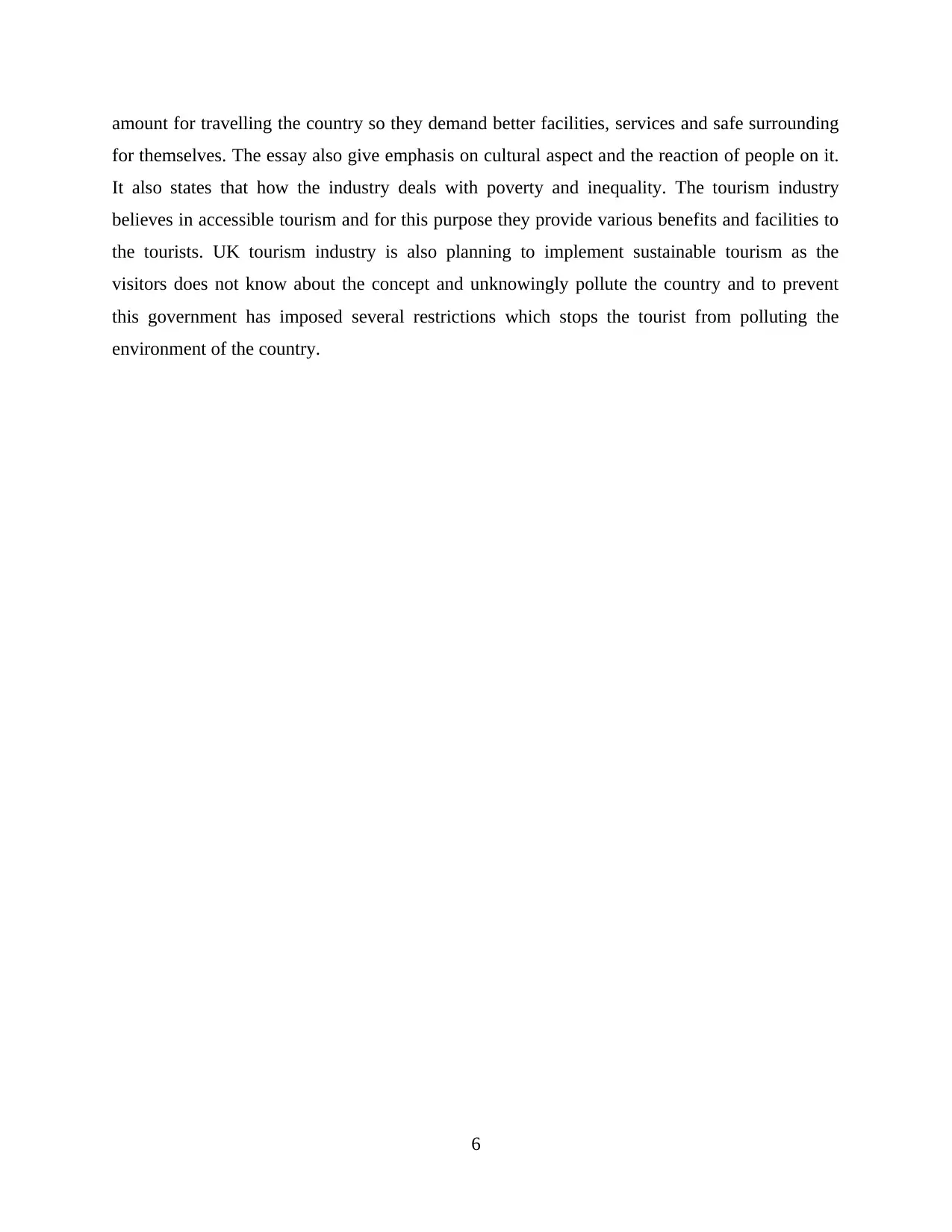
amount for travelling the country so they demand better facilities, services and safe surrounding
for themselves. The essay also give emphasis on cultural aspect and the reaction of people on it.
It also states that how the industry deals with poverty and inequality. The tourism industry
believes in accessible tourism and for this purpose they provide various benefits and facilities to
the tourists. UK tourism industry is also planning to implement sustainable tourism as the
visitors does not know about the concept and unknowingly pollute the country and to prevent
this government has imposed several restrictions which stops the tourist from polluting the
environment of the country.
6
for themselves. The essay also give emphasis on cultural aspect and the reaction of people on it.
It also states that how the industry deals with poverty and inequality. The tourism industry
believes in accessible tourism and for this purpose they provide various benefits and facilities to
the tourists. UK tourism industry is also planning to implement sustainable tourism as the
visitors does not know about the concept and unknowingly pollute the country and to prevent
this government has imposed several restrictions which stops the tourist from polluting the
environment of the country.
6

7
⊘ This is a preview!⊘
Do you want full access?
Subscribe today to unlock all pages.

Trusted by 1+ million students worldwide
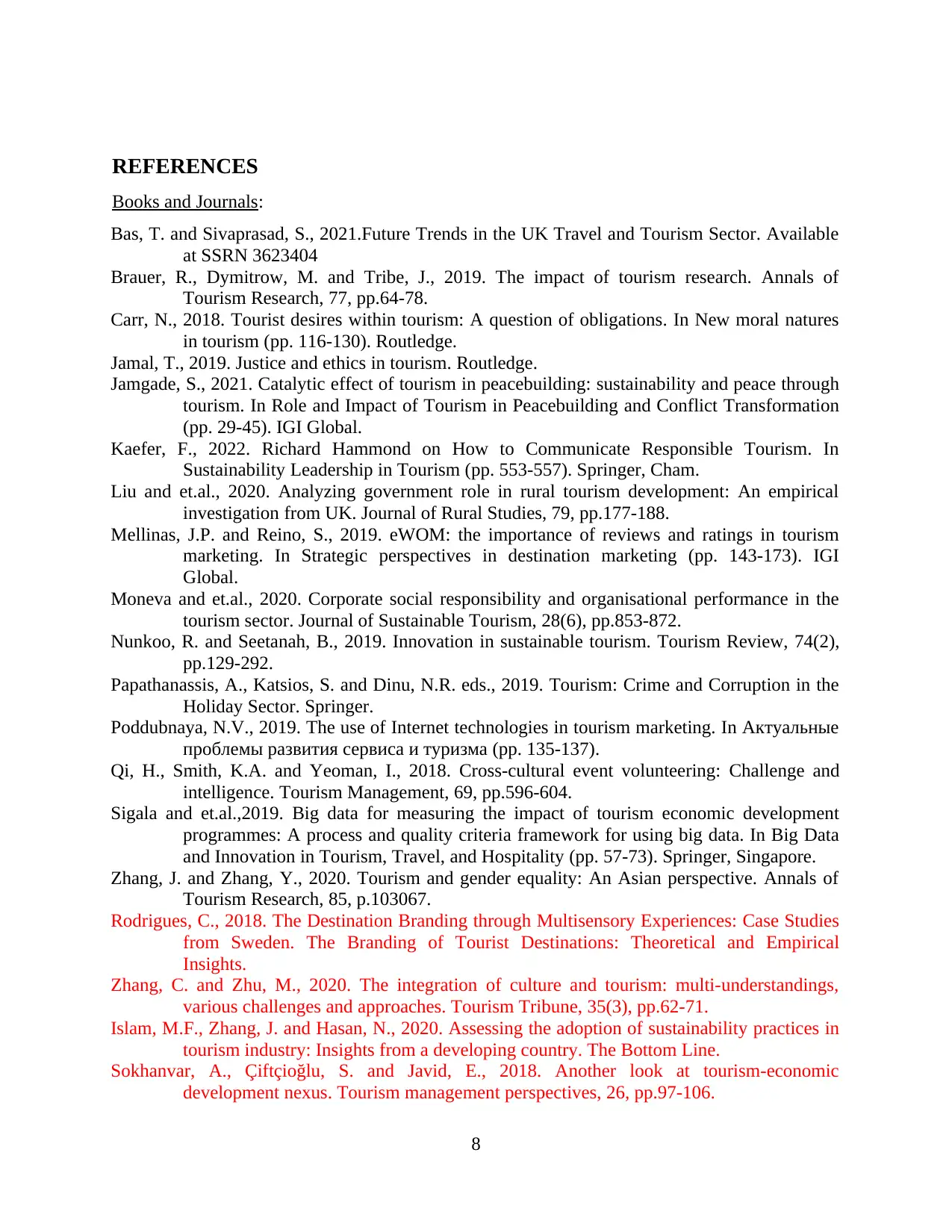
REFERENCES
Books and Journals:
Bas, T. and Sivaprasad, S., 2021.Future Trends in the UK Travel and Tourism Sector. Available
at SSRN 3623404
Brauer, R., Dymitrow, M. and Tribe, J., 2019. The impact of tourism research. Annals of
Tourism Research, 77, pp.64-78.
Carr, N., 2018. Tourist desires within tourism: A question of obligations. In New moral natures
in tourism (pp. 116-130). Routledge.
Jamal, T., 2019. Justice and ethics in tourism. Routledge.
Jamgade, S., 2021. Catalytic effect of tourism in peacebuilding: sustainability and peace through
tourism. In Role and Impact of Tourism in Peacebuilding and Conflict Transformation
(pp. 29-45). IGI Global.
Kaefer, F., 2022. Richard Hammond on How to Communicate Responsible Tourism. In
Sustainability Leadership in Tourism (pp. 553-557). Springer, Cham.
Liu and et.al., 2020. Analyzing government role in rural tourism development: An empirical
investigation from UK. Journal of Rural Studies, 79, pp.177-188.
Mellinas, J.P. and Reino, S., 2019. eWOM: the importance of reviews and ratings in tourism
marketing. In Strategic perspectives in destination marketing (pp. 143-173). IGI
Global.
Moneva and et.al., 2020. Corporate social responsibility and organisational performance in the
tourism sector. Journal of Sustainable Tourism, 28(6), pp.853-872.
Nunkoo, R. and Seetanah, B., 2019. Innovation in sustainable tourism. Tourism Review, 74(2),
pp.129-292.
Papathanassis, A., Katsios, S. and Dinu, N.R. eds., 2019. Tourism: Crime and Corruption in the
Holiday Sector. Springer.
Poddubnaya, N.V., 2019. The use of Internet technologies in tourism marketing. In Актуальные
проблемы развития сервиса и туризма (pp. 135-137).
Qi, H., Smith, K.A. and Yeoman, I., 2018. Cross-cultural event volunteering: Challenge and
intelligence. Tourism Management, 69, pp.596-604.
Sigala and et.al.,2019. Big data for measuring the impact of tourism economic development
programmes: A process and quality criteria framework for using big data. In Big Data
and Innovation in Tourism, Travel, and Hospitality (pp. 57-73). Springer, Singapore.
Zhang, J. and Zhang, Y., 2020. Tourism and gender equality: An Asian perspective. Annals of
Tourism Research, 85, p.103067.
Rodrigues, C., 2018. The Destination Branding through Multisensory Experiences: Case Studies
from Sweden. The Branding of Tourist Destinations: Theoretical and Empirical
Insights.
Zhang, C. and Zhu, M., 2020. The integration of culture and tourism: multi-understandings,
various challenges and approaches. Tourism Tribune, 35(3), pp.62-71.
Islam, M.F., Zhang, J. and Hasan, N., 2020. Assessing the adoption of sustainability practices in
tourism industry: Insights from a developing country. The Bottom Line.
Sokhanvar, A., Çiftçioğlu, S. and Javid, E., 2018. Another look at tourism-economic
development nexus. Tourism management perspectives, 26, pp.97-106.
8
Books and Journals:
Bas, T. and Sivaprasad, S., 2021.Future Trends in the UK Travel and Tourism Sector. Available
at SSRN 3623404
Brauer, R., Dymitrow, M. and Tribe, J., 2019. The impact of tourism research. Annals of
Tourism Research, 77, pp.64-78.
Carr, N., 2018. Tourist desires within tourism: A question of obligations. In New moral natures
in tourism (pp. 116-130). Routledge.
Jamal, T., 2019. Justice and ethics in tourism. Routledge.
Jamgade, S., 2021. Catalytic effect of tourism in peacebuilding: sustainability and peace through
tourism. In Role and Impact of Tourism in Peacebuilding and Conflict Transformation
(pp. 29-45). IGI Global.
Kaefer, F., 2022. Richard Hammond on How to Communicate Responsible Tourism. In
Sustainability Leadership in Tourism (pp. 553-557). Springer, Cham.
Liu and et.al., 2020. Analyzing government role in rural tourism development: An empirical
investigation from UK. Journal of Rural Studies, 79, pp.177-188.
Mellinas, J.P. and Reino, S., 2019. eWOM: the importance of reviews and ratings in tourism
marketing. In Strategic perspectives in destination marketing (pp. 143-173). IGI
Global.
Moneva and et.al., 2020. Corporate social responsibility and organisational performance in the
tourism sector. Journal of Sustainable Tourism, 28(6), pp.853-872.
Nunkoo, R. and Seetanah, B., 2019. Innovation in sustainable tourism. Tourism Review, 74(2),
pp.129-292.
Papathanassis, A., Katsios, S. and Dinu, N.R. eds., 2019. Tourism: Crime and Corruption in the
Holiday Sector. Springer.
Poddubnaya, N.V., 2019. The use of Internet technologies in tourism marketing. In Актуальные
проблемы развития сервиса и туризма (pp. 135-137).
Qi, H., Smith, K.A. and Yeoman, I., 2018. Cross-cultural event volunteering: Challenge and
intelligence. Tourism Management, 69, pp.596-604.
Sigala and et.al.,2019. Big data for measuring the impact of tourism economic development
programmes: A process and quality criteria framework for using big data. In Big Data
and Innovation in Tourism, Travel, and Hospitality (pp. 57-73). Springer, Singapore.
Zhang, J. and Zhang, Y., 2020. Tourism and gender equality: An Asian perspective. Annals of
Tourism Research, 85, p.103067.
Rodrigues, C., 2018. The Destination Branding through Multisensory Experiences: Case Studies
from Sweden. The Branding of Tourist Destinations: Theoretical and Empirical
Insights.
Zhang, C. and Zhu, M., 2020. The integration of culture and tourism: multi-understandings,
various challenges and approaches. Tourism Tribune, 35(3), pp.62-71.
Islam, M.F., Zhang, J. and Hasan, N., 2020. Assessing the adoption of sustainability practices in
tourism industry: Insights from a developing country. The Bottom Line.
Sokhanvar, A., Çiftçioğlu, S. and Javid, E., 2018. Another look at tourism-economic
development nexus. Tourism management perspectives, 26, pp.97-106.
8
Paraphrase This Document
Need a fresh take? Get an instant paraphrase of this document with our AI Paraphraser
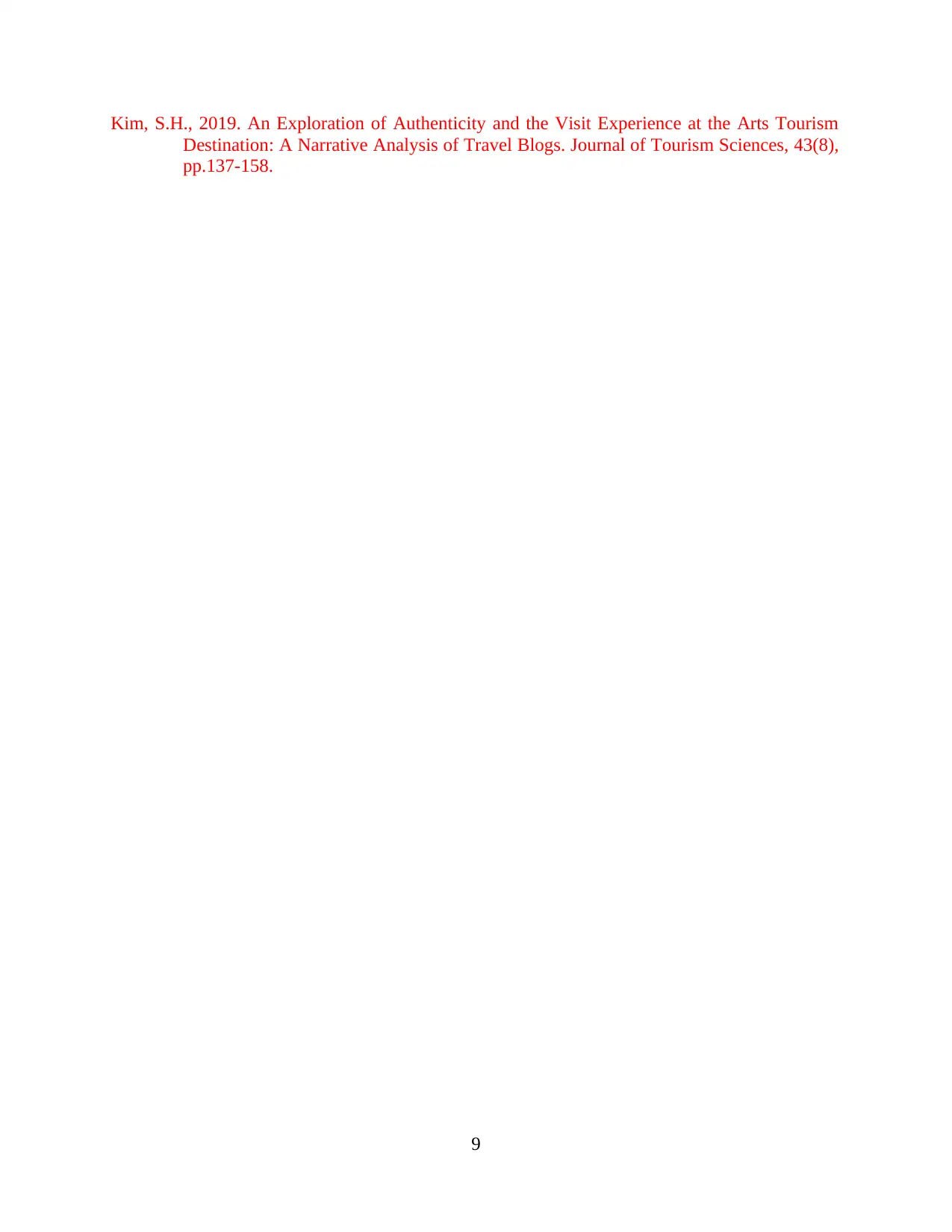
Kim, S.H., 2019. An Exploration of Authenticity and the Visit Experience at the Arts Tourism
Destination: A Narrative Analysis of Travel Blogs. Journal of Tourism Sciences, 43(8),
pp.137-158.
9
Destination: A Narrative Analysis of Travel Blogs. Journal of Tourism Sciences, 43(8),
pp.137-158.
9
1 out of 11
Related Documents
Your All-in-One AI-Powered Toolkit for Academic Success.
+13062052269
info@desklib.com
Available 24*7 on WhatsApp / Email
![[object Object]](/_next/static/media/star-bottom.7253800d.svg)
Unlock your academic potential
Copyright © 2020–2026 A2Z Services. All Rights Reserved. Developed and managed by ZUCOL.




